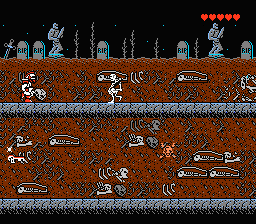Color Dreams
Video game developer and publisher From Wikipedia, the free encyclopedia
Color Dreams (d/b/a StarDot Technologies) is an American company formerly known for developing and publishing unlicensed video games for the 8-bit Nintendo Entertainment System (NES). The company left the video game industry in the mid-1990s, shifting its focus to IP cameras and related surveillance equipment.[3][4]
This article needs additional citations for verification. (September 2016) |
| Industry | Video games (formerly) Electronics (as StarDot Technologies) |
|---|---|
| Founded | 1988 |
| Defunct | 1997 |
| Fate | reformed as StarDot Technologies |
| Successor | Wisdom Tree StarDot Technologies |
| Headquarters | , |
Key people | Dan Lawton (founder/co-owner)[2] |
| Products | Various video games for Nintendo Entertainment System IP cameras (as StarDot Technologies) |

History
Summarize
Perspective
While most companies that developed NES games obtained an official license from Nintendo to produce game cartridges, Color Dreams was unusual in that it developed NES games without an official license.[5] To produce these unlicensed games, Color Dreams had to bypass the NES's "lock out" chip (the 10NES).[6] The company successfully bypassed the system, developed a game (Baby Boomer), and released it in 1989. Several other titles followed in 1989 and 1990, including Captain Comic, Crystal Mines, and Robodemons.
As a result of its reputation for releasing poor games, Color Dreams formed the label Bunch Games in 1990. Bunch Games was meant to be a label that Color Dreams could use to release lower quality games so that its reputation would not be damaged further. Using this label, Color Dreams published several English versions of games by Sachen.[7]
In 1991, Color Dreams formed Wisdom Tree for the purpose of releasing Christianity-themed games. The Wisdom Tree label resulted in Color Dreams' best selling titles, including Spiritual Warfare and Bible Adventures. Wisdom Tree is also noted for creating the only unlicensed SNES game to ever be released in North America, Super 3D Noah's Ark.[8] While Wisdom Tree remains active today and is still selling religious video games, Color Dreams left the video game business in 1996 to focus on digital camera development, now trading as StarDot Technologies.[2][4][9]
Cancelled projects
One Color Dreams project that was never released was a game based on the movie Hellraiser.[2] The game cartridge, or "Super Cartridge" as it was called at the time, contained an extra processor that modified the tiles in the cartridge RAM without alerting the NES processor. This allowed for enhanced graphic effects rarely seen on the NES, such as a fully animated background running without the lag usually found with such tricks. The extra processor also performed palette swapping between scans of the TV to give the illusion of extra color. Because of delays in production, development problems, lack of a market for unlicensed games based on horror movies, and the exorbitant amount of money it took to make each Super Cartridge, the project was eventually abandoned.[10][11]
Legacy
In August 2011, Ken Beckett, the programmer of Crystal Mines, released the source code under a custom permissive license to the public.[12][13] Artwork is still proprietary, but can be shared for non-commercial, personal use.[14]
Video games published by Color Dreams
Summarize
Perspective
All games were developed for the Nintendo Entertainment System unless otherwise noted.
- Baby Boomer (1989)
- Captain Comic (1989; also known as The Adventures of Captain Comic)
- Crystal Mines (1989)
- Master Chu and the Drunkard Hu (1989; developed by Joy Van)
- Metal Fighter (1989; the U.S. version of Joyvan Kid, developed by Joy Van)
- Raid 2020 (1989)
- Challenge of the Dragon (1990)
- King Neptune's Adventure (1990)
- Menace Beach (1990)
- P'radikus Conflict (1990)
- Pesterminator: The Western Exterminator (1990)
- Robodemons (1990)
- Silent Assault (1990; the U.S. version of Raid, developed by Joy Van)
- Captain Comic II: Fractured Reality (1990; only for MS-DOS)
- Operation Secret Storm (1991)
- Secret Scout in the Temple of Demise (1991)
- Crystal Mines II (1992; only for Atari Lynx)
- Free Fall (prototype)
As Bunch Games
- Castle of Deceit (1990)
- Galactic Crusader (1990; the U.S. version of Incantation, developed by Joy Van)
- Mission Cobra (1990; the U.S. version of Sidewinder, developed by Joy Van)
- Moon Ranger (1990; developed by Odyssey Software)
- Tagin' Dragon (1990; the U.S. version of Colorful Dragon, developed by Sachen)
As Wisdom Tree
- Bible Adventures (1991)
- Exodus (1991)
- King of Kings: The Early Years (1991)
- Joshua & the Battle of Jericho (1992)
- Spiritual Warfare (1992)
- Bible Buffet (1993)
- Super 3D Noah's Ark (1994; for Super NES and MS-DOS)
- Sunday Funday (1995)
See also
References
External links
Wikiwand - on
Seamless Wikipedia browsing. On steroids.
